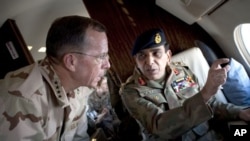Pakistani officials sounded off with angry and categorical responses to Adm. Mike Mullen's allegations that their Inter-Services Intelligence agency (ISI) is backing militant attacks on U.S. targets in Afghanistan.
Mullen sent shockwaves into the already strained relations between Washington and Islamabad by directly accusing ISI of backing a Taliban ally, the Haqqani network, in recent attacks on U.S. targets in Kabul and elsewhere.
Mullen's Pakistani counterpart, General Ashfaq Kayani, denied any ISI support for the Haqqanis and called comments by the chairman of the Joint Chiefs of Staff “especially unfortunate” in light of what he called a “rather constructive” recent meeting between the two men in Spain.
Pakistan Foreign Minister Hina Rabbani Khar warned that Washington risks losing Pakistan’s strategic partnership in the war against terrorism if U.S. leaders continue to make such accusations.
“You will lose an ally, you cannot afford to alienate Pakistan, you cannot afford to alienate the Pakistani people," said Rabbani. "If you are choosing to do so it will be at your own cost.”
Washington has long accused Pakistan of not doing enough to crack down on militant groups in its territory.
A rocky relationship
The up-and-down U.S.-Pakistani relationship seemed to be on a slight upward curve recently after suffering a series of heavy blows. The arrest of a CIA contractor in Pakistan, repeated U.S. drone strikes on militant targets in Pakistan’s tribal areas, and the U.S. raid to kill Osama bin Laden had soured ties, but there was talk of new cooperation in battling terrorism.
Former State Department intelligence analyst Marvin Weinbaum, now a scholar with the Middle East Institute, says Mullen’s comments reflect official U.S. frustration with the twists and turns of Pakistan’s policies regarding Afghanistan and militancy.
“I think we just were exasperated with the people, particularly with those in the Pakistan military who we thought we had some kind of working relationship with," said Weinbaum. "We thought we understood one another and we've come to the conclusion that these relationships do not work anymore."
Weinbaum said Mullen's comments illustrate U.S. willingness to assume a confrontational stance with Islamabad, whose strategic interest in Afghanistan has always been complicated by concerns about the diplomatic, political and economic inroads made there by its archrival, India.
"[Pakistan] may believe that by using these proxies they are hedging their bets, or redressing what they feel is an imbalance in regional power," Mullen said, alluding to what he calls Pakistan’s policy of using militant groups like the Haqqani network to secure influence in Kabul. "Only a decision to break with this policy can pave the road to a positive future."
Professor Christine Fair of Georgetown University, a longtime expert on South Asian affairs, says there may not much the U.S. can do.
"We do not have a lot of options in terms of the duplicity of the ISI," she said. "We do not have a lot of options in terms of the Haqqani network. We do not have a lot of options with regard to Lashkar-i-Taiba and other militant groups that Pakistan continues to groom. Even though the ISI is very clearly a foreign organization that sponsors terrorism, we are not going to declare it as such."
A pivotal moment
Mullen’s stark comments come against the backdrop of Obama administration plans to pull U.S. combat forces from Afghanistan in 2014 and turn security over to the Afghan government.
The U.S. has also pinned hopes on some political reconciliation between some elements of the Taliban and the Afghan government, and Pakistan has envisioned having some role in that process. Those hopes were dealt a severe blow by the recent assassination of former Afghan president Burhanuddin Rabbani, who led the Afghan High Peace Council. Although claims of responsibility are murky, military and diplomatic fallout raise new questions about prospects for reconciliation between the Taliban and the Afghan government.
Weinbaum, however, believes U.S. hopes for such negotiated political settlement were always misplaced.
“It was self-delusion because we are so desperate to find a shortcut out of this mess that we are in in Afghanistan," he said, explaining that attacks on the U.S. embassy and the Rabbani killing only demonstrate that the Taliban have no appetite for reconciliation talks.
"That we are willing to say that maybe there is a formula out there, a political formula, which could wind this up more quickly," he said. "I do not see how anybody could have taken that seriously."
Analysts: Fraying US-Pakistan Ties Imperil Afghan Peace Efforts
- By Gary Thomas




